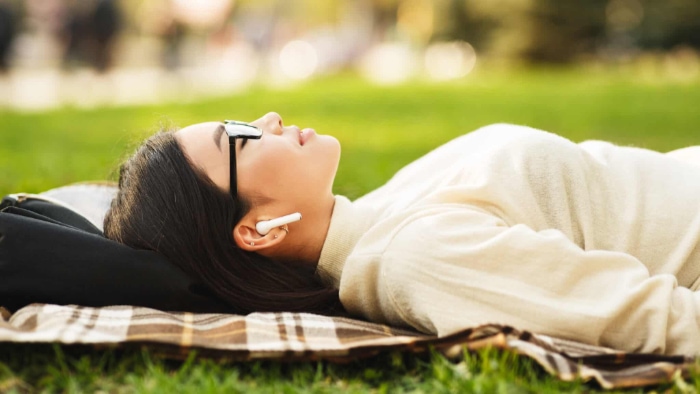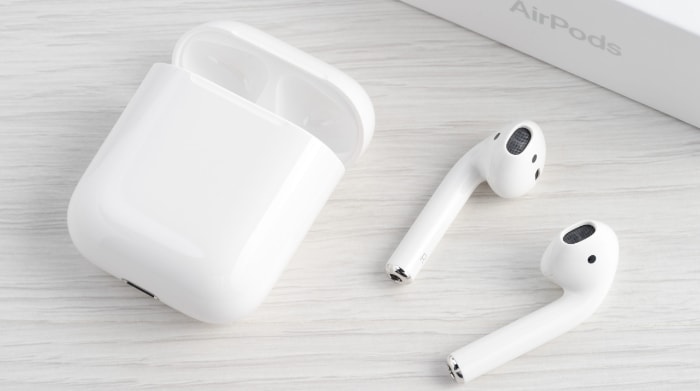Can I Wear AirPods While Sleeping? Exploring Night Comfort

Sleeping with headphones isn’t a new concept, but the rise of AirPods has brought a fresh twist to this practice. These tiny, wireless devices have become a staple in our daily lives, effortlessly blending with various activities – from commuting to workouts.
But when it comes to catching Z’s, do AirPods make the cut? This article dives into the intriguing world of using AirPods as a sleep aid. We’ll explore comfort, health implications, and whether these popular gadgets can actually improve your sleep experience or if they might be a hindrance to a good night’s rest.
The Comfort Factor
Comfort is key when it comes to wearing any device for extended periods, especially during sleep. AirPods, known for their sleek and minimalist design, have become a popular choice for many.
Yet, when it comes to sleeping with them, there are several factors to consider. The design’s impact on comfort, potential pressure points, and the difference between various models are all crucial aspects to explore.
Physical Design and Sleep Comfort
AirPods are designed with a one-size-fits-most approach. Their wireless nature eliminates the discomfort of tangled wires.
However, the hard plastic can be a concern for some users, especially when lying on one’s side. Continuous pressure against the ear can lead to discomfort or even pain, potentially disrupting sleep.
Comparing AirPod Models
The original AirPods and the AirPods Pro offer different experiences in terms of comfort. The AirPods Pro come with silicone tips and feature an in-ear design, providing a more snug fit.
This can be beneficial for stability but might increase the feeling of ear fullness for some users. On the other hand, the regular AirPods have a more open design, which some find less intrusive for long periods, such as a full night’s sleep.
Individual Ear Shape and Preference
No two ears are alike, and what feels comfortable for one person might be unbearable for another. Factors like the size of the ear canal, sensitivity, and personal preference play a significant role in determining whether sleeping with AirPods is a viable option.
It’s important for users to consider their own unique ear anatomy and comfort thresholds.
The Role of Sleeping Position
Your sleeping position can greatly affect how comfortable AirPods are to sleep with. Side sleepers might find them more bothersome as the ear pressing against the pillow can push the AirPods deeper into the ear canal.
Back sleepers may have a more favorable experience, as there is less direct pressure on the ears.
Tips for Enhancing Comfort
For those committed to sleeping with AirPods, there are ways to improve comfort. Using soft covers made of foam or silicone can provide a cushion between the ear and the AirPod.
Additionally, adjusting the position slightly off from the direct pressure point in the ear canal can make a significant difference in comfort levels.
Health Considerations
While the convenience of AirPods is undeniable, it’s essential to ponder the health implications of wearing them during sleep. Concerns range from the potential for ear canal blockages to the effects of prolonged exposure to Bluetooth radiation.
Understanding these risks is crucial for making informed decisions about using AirPods as a sleep aid.
Potential Risks of Ear Canal Blockage
Wearing AirPods for prolonged periods, especially during sleep, can lead to the risk of ear canal blockage. This blockage is not just about the physical presence of the device in the ear, but also about the potential buildup of earwax.
Over time, this can lead to discomfort, reduced hearing, and in some cases, infections.
Pressure Sores and Skin Irritation
The constant pressure of AirPods against the delicate skin of the ear canals and outer ear during sleep may lead to pressure sores or skin irritation. This is particularly true for side sleepers who might experience more significant pressure on one ear.
Such issues can not only be uncomfortable but could also lead to more serious skin conditions if left unchecked.
Impact of Continuous Bluetooth Exposure
The long-term effects of continuous exposure to Bluetooth radiation, as with any wireless device, remain a topic of ongoing research. While current evidence suggests that the low levels of radiation emitted by devices like AirPods are safe, there is still a need for more comprehensive studies, particularly concerning prolonged exposure during sleep.
Managing Ear Health
To mitigate these health risks, regular cleaning of both the AirPods and ears is essential. It’s also advisable to limit the continuous use of AirPods, especially during sleep, to prevent earwax buildup and pressure sores.
Alternating ears if using a single AirPod for sleep could also help distribute pressure more evenly.
Seeking Professional Advice
For individuals with existing ear conditions or those who experience discomfort or pain from using AirPods during sleep, consulting with a healthcare professional is recommended. They can provide personalized advice and help assess whether using AirPods in this way is suitable for your specific health needs.
Impact on Sleep Quality
The quality of our sleep is influenced by a myriad of factors, including the environment and our habits. Introducing AirPods into the sleep routine has become increasingly common, but it’s important to examine how they might affect sleep quality.
From the potential benefits of noise cancellation to the possible disruptions caused by audio content, the impact of AirPods on sleep is a nuanced topic.
Role of Noise Cancellation in Sleep
AirPods Pro, with their noise cancellation feature, can be beneficial for sleep in noisy environments. By reducing ambient sounds, they can create a more tranquil atmosphere conducive to falling and staying asleep.
However, it’s crucial to consider if the complete isolation from environmental sounds is safe and comfortable for every user.
Audio Content and Sleep Cycles
The type of audio played through AirPods can significantly influence sleep patterns. Soothing music or white noise can aid in relaxation and potentially improve sleep quality.
On the other hand, stimulating content, like podcasts or upbeat music, might inadvertently keep the brain active, making it harder to achieve deep sleep.
Potential Disruptions from Alerts and Notifications
If connected to a device that receives notifications, AirPods could disrupt sleep with unexpected sounds. These interruptions can fragment sleep, reducing the overall quality and leaving the user feeling less rested.
It’s advisable to manage device settings to minimize such disturbances during sleep.
Volume Levels and Ear Health
Listening to audio at high volumes for extended periods, even during sleep, can lead to hearing issues over time. Maintaining a low, comfortable volume not only protects ear health but also ensures that the audio aids rather than disrupts sleep.
Personal Sleep Patterns and Preferences
Every individual has unique sleep needs and patterns. What works as a sleep aid for one person might be a hindrance for another.
Users should pay attention to their own sleep quality and patterns when introducing AirPods into their bedtime routine, adjusting usage according to their personal experience and comfort.
Battery Life and Safety Concerns

Using AirPods throughout the night raises questions about battery life and safety. While AirPods are designed with advanced battery technology, continuous use, especially over several hours, can strain their limits.
Beyond just the inconvenience of a dead battery, there are important safety considerations to keep in mind when using AirPods for prolonged periods, particularly during sleep.
Understanding AirPods’ Battery Capacity
AirPods are engineered to last for several hours on a single charge. However, their battery life diminishes when used continuously, such as during a full night’s sleep.
This means they may not last the entire night, especially if they are not fully charged before use.
Risks of Battery Overheating
Like any electronic device, AirPods generate heat during use. While cases of battery overheating are rare, wearing them for extended periods, such as during sleep, can potentially increase this risk.
Although the design and safety features of AirPods are meant to prevent overheating, it’s still a factor worth considering.
Managing Battery Life for Overnight Use
To optimize battery life for overnight use, consider adjusting settings like volume level and turning off features that are not needed, like noise cancellation or automatic ear detection. These adjustments can help conserve battery power, ensuring the AirPods last longer.
Charging Practices
It’s important to follow safe charging practices. This includes using the correct charger and avoiding leaving AirPods in the charging case plugged in for extended periods after they’ve reached full charge.
Proper charging habits not only prolong the life of the battery but also minimize potential safety risks.
Alternatives for Sleep
While AirPods offer a modern solution to incorporating audio into sleep routines, they aren’t the only option available. For those looking for alternatives that might better suit their sleep needs, several other devices and methods can enhance sleep quality without some of the drawbacks associated with AirPods.
From specialized sleep headphones to traditional non-tech methods, there are various ways to achieve a peaceful night’s sleep.
Specialized Sleep Headphones
Sleep headphones are specifically designed for comfort and safety during sleep. These often come in the form of soft headbands with thin, flat speakers, which are less intrusive and more comfortable for side sleepers.
They are an excellent option for those who find the hard plastic of AirPods uncomfortable.
Sleep Masks with Built-In Audio
For those who benefit from both darkness and sound while sleeping, sleep masks with built-in audio present a two-in-one solution. These masks block out light while providing audio capabilities, helping to create an ideal sleep environment, especially in brightly lit or noisy settings.
White Noise Machines
White noise machines are a popular non-tech alternative that can be used to create a soothing sleep environment. They produce a consistent, ambient sound that can mask disruptive noises from the environment, helping to improve sleep quality, particularly for light sleepers.
Traditional Earplugs
For those who prefer silence, traditional earplugs are a simple and effective way to block out external noise. Available in various materials like foam or silicone, they can be chosen based on comfort preference and are a cost-effective solution for noise reduction.
Audio Pillow Speakers
Pillow speakers are another innovative solution for integrating audio into the sleep experience. These are small, flat speakers that can be placed under the pillow, providing sound directly without the need to wear any device in or on the ears.
This option is ideal for those who find wearing headphones or earbuds in bed uncomfortable.
Conclusion
Exploring the possibility of wearing AirPods while sleeping reveals a complex interplay of comfort, health considerations, impact on sleep quality, safety concerns, and available alternatives. It’s clear that while AirPods offer a convenient and high-tech solution for integrating audio into our bedtime routines, they also come with potential drawbacks.
Comfort levels vary based on individual ear shapes and sleeping positions, and there are valid health concerns ranging from ear canal blockage to the impact of continuous Bluetooth exposure. When it comes to sleep quality, the type of audio content and volume levels play crucial roles, and the battery life and safety aspects of AirPods cannot be overlooked.
For those who find AirPods less than ideal for sleep, a range of alternatives exists. From specialized sleep headphones and audio-equipped sleep masks to white noise machines and traditional earplugs, these options cater to diverse needs and preferences.
Ultimately, the choice to use AirPods or any alternative for sleep depends on personal comfort, health considerations, and specific sleep habits.
Embracing technology for better sleep is a personal journey, and what works for one may not suit another. It’s important to weigh the pros and cons carefully, consider individual needs and preferences, and perhaps even consult a healthcare professional if there are concerns about the impact on ear health or sleep quality.
With the right approach and tools, achieving a restful night’s sleep in the digital age is certainly within reach.


